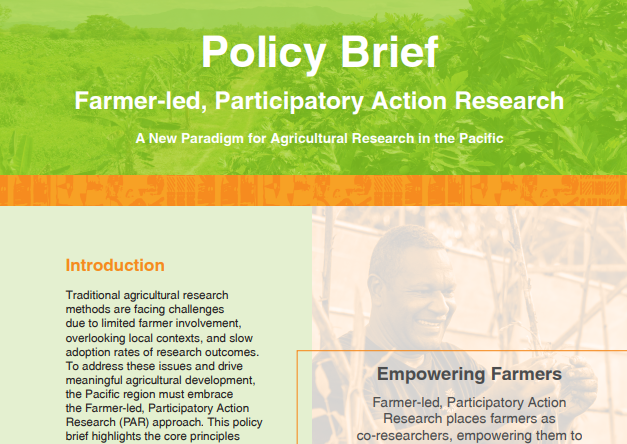PIFON Farmer Led Research Policy Brief (Read Here)
Traditional agricultural research methods are facing challenges due to limited farmer involvement, overlooking local contexts, and slow adoption rates of research outcomes.
To address these issues and drive meaningful agricultural development, the Pacific region must embrace the Farmer-led, Participatory Action Research (PAR) approach. This policy brief highlights the core principles of PAR and advocates its adoption as a more effective and inclusive agricultural research paradigm.
PAR places farmers at the center of the research and innovation process, ensuring active collaboration among all stakeholders throughout the research cycle. Farmers actively participate in decision-making, research activities, and knowledge exchange with researchers. The approach emphasizes sustainability, inclusivity, and empowering farmers as co-researchers.
- Farmer Empowerment: Recognizing farmers as knowledge holders, PAR involves them as leaders and active participants in the research process. This empowerment enhances the relevance and adoption of research outcomes.
- Local Context Consideration: PAR prioritizes understanding diverse local contexts, including climate, soil, and culture. Context-specific solutions lead to more effective and sustainable agricultural practices.
- Knowledge Exchange: The collaborative nature of PAR ensures mutual knowledge sharing between farmers, researchers, and other stakeholders. This integration of traditional and technical knowledge contributes to innovation and dissemination through farmer to farmer exchanges.
- Sustainable Practices: PAR promotes sustainable farming methods that respect environmental preservation, resource management, and ecological balance.
- Evidence-based Policy: Involving farmers in the policymaking process ensures that agricultural policies address real challenges and align with local needs.
- Long-term Commitment: Successful PAR initiatives require long-term engagement by all stakeholders, thereby building trust, and fostering meaningful relationships among stakeholders.
- Inclusivity and Equity: PAR emphasizes fair and equitable partnerships, recognizing the role of farmer organisations in research governance and co-constructing solutions.

